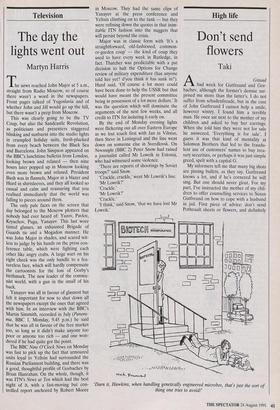Television
The day the lights went out
Martyn Harris
The news reached John Major at 5 a.m., straight from Radio Moscow, so of course there wasn't a word in the newspapers. Front pages talked of Yugoslavia and of whether John and Jill would go up the hill, but there wasn't a peep from Moscow.
This was clearly going to be the TV Coup, but also the Sandcastle Revolution, as politicians and presenters staggered blinking and sunburnt into the studio lights in crumpled holiday suits, fresh-plucked from every beach between the Black Sea and Barcelona. John Simpson appeared on the BBC's lunchtime bulletin from London, looking brown and relaxed — then nine hours later popped up in Moscow looking even more brown and relaxed. President Bush was in flannels, Major in a blazer and Hurd in shirtsleeves, and they all looked so casual and calm and reassuring that you realised immediately that the world was falling to pieces around them.
The only pale faces on the screen that day belonged to the Moscow plotters that nobody had ever heard of: Yazov, Pavlov, Kryuchov, Puga, Yanayev. This last wore tinted glasses, an exhausted Brigade of Guards tie and a Mogadon manner. He was John Major in shades, and scared wit- less to judge by his hands on the press con- ference table, which were fighting each other like angry crabs. A large wart on his right cheek was the only handle to a fea- tureless face, which will hardly compensate the cartoonists for the loss of Gorby's birthmark. The new leader of the commu- nist world, with a gun in the small of his back.
Yanayev was all in favour of glasnost but felt it important for now to shut down all the newspapers except the ones that agreed with him. In an interview with the BBC's Martin Sixsmith, recorded in July (Panora- ma, BBC 1, Monday, 9.45 p.m.) he said that he was all in favour of the free market too, so long as it didn't make anyone too poor or anyone too rich — and one won- dered if he had quite got the point.
The BBC Nine O'Clock News on Monday was fast to pick up the fact that armoured units loyal to Yeltsin had surrounded the Russian Parliament building, and there was a good, thoughtful profile of Gorbachev by Brian. Hanrahan. On the whole, though, it was ITN's News at Ten which had the best night of it, with a fast-moving but con- trolled report anchored by Robert Moore
in Moscow. They had the same clips of Yanayev at the press conference and Yeltsin climbing on to the tank — but they were refining down the quotes in that inim- itable ITN fashion into the nuggets that will persist beyond the crisis.
Major was in classic form with 'It's a straightforward, old-fashioned, common- or-garden coup' — the kind of coup they used to have every week in Rutledge, in fact. Thatcher was predictable with a pat decision to halt the Options for Change review of military expenditure (has anyone told her yet? d'you think it has sunk in?). Hurd said, 'Of course a lot more could have been done to help the USSR but that would have meant the present committee being in possession of a lot more dollars.' It was the question which will dominate the arguments of the next few weeks, and all credit to ITN for isolating it early on.
By the end of Monday evening lights were flickering out all over Eastern Europe as we lost touch first with Jan in Vilnius, then Steve in Leningrad and the line went down on someone else in Sverdlovsk. On Newsnight (BBC 2) Peter Snow had raised a journalist called Mr Lowrik in Estonia, who had witnessed some violence.
'There are reports of shootings by Soviet troops?' said Snow. `Crackle, crackle,' went Mr Lowrik's line. `Mr Lowrik?'
`Crackle.'
`Mr Lowrik?'
`Crackle.'
`I think,' said Snow, 'that we have lost Mr Lowrik.'


















































 Previous page
Previous page